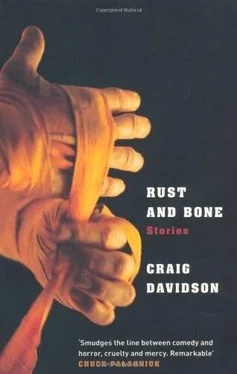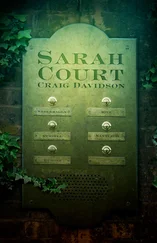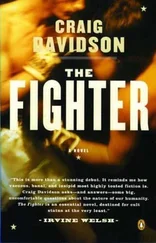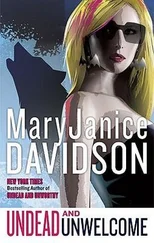“I received this trunk,” Cartouche said, indicating the tea chest, “from an aged swami in the hills of Vindhya.” This was a considerable embellishment: he’d traded it for a crystal radio and a ship in a bottle at the Stittsville flea market. “Anyone who enters is transported to a dimension the polar opposite of our own, where black is white and hot is cold, where men toil under the light of the full moon and sleep in daylight, where—”
“Where droning windbags turn into big-breasted strippers,” Hal offered.
“Silence!” Cartouche knelt before the young boy. “Well, son?” he whispered. “Think you can do this without screwing it up?”
The boy nodded without meeting his father’s eyes. Cartouche said, “Alright, then. I hand you the reins.”
The girl pried the heavy lid up. Cartouche stepped inside. She clasped the lock as the boy waved his hands over the chest.
“Floobidaa, floobidoo, floobidee …” the boy chanted.
Standing off to one side, the girl watched and listened carefully. She did not hear the soft snik as the hidden latch disengaged, or the gathering outrush of air as the chest’s false back levered down. She’d watched her brother practice this escape for hours in the basement, amidst the mismatched golf clubs and dusty boxes piled to the ceiling beams, and, no matter how many times he’d repeated it, he’d never effected a silent escape: the latch would snap audibly or not open at all, his head would bump the lid or the false back would strike the floor with a clatter. She didn’t see the magician scurry from the box, or the drapes part even slightly in the wake of his passage.
The boy tapped the lid three times. “I banish you from this realm!” He nodded to the girl. “My assistant will now open the lid.”
She shot her brother a compressed acid look. She lifted the lid. The chest was empty.
“Feast your eyes—banished!”
“Whoop-de-doo,” said Hal.
“Now to bring him back,” the boy said, brandishing the wand like a fencer’s épée, tapping the chest three times. “Return to this realm!”
When the girl opened the lid, the chest was still empty.
Hal said, “Good riddance.”
The boy glanced at his sister. Desperation twisted his features. “Jess, what …?”
The girl slipped behind the curtain. The magician was nowhere in sight. She pushed through a swinging door into a narrow kitchen, hating the clumsy sound of her heels on the glossy tiles, turning the knob on another door opening into a narrow alleyway.
“Daddy?” she called softly. “Dad?”
The girl stood in a jaundiced sheet of light cast through the kitchen door, the warm humid night pressed to her temples. Her father’s Datsun was still parked at the mouth of the alley, next to four or five garbage cans dragged to the curb for tomorrow’s pickup. She smelled, or believed she could, a lingering trace of his cologne, a foreign brand ordered in ten-bottle lots.
He was gone. He’d … vanished .
A great clamor suddenly arose from the Pythian congregation. She hurried back through the kitchen and slipped through the curtains.
“Oh, no …”
Her brother had decided to push on with the show. He’d dipped
into his father’s valise, where the chemicals and powders for his most stirring illusions were hidden. He’d obviously attempted the Fiery Orb, in which a golden fireball explodes from the magician’s chest towards the audience, extinguishing mere feet from their faces. Expertly performed, the trick is thrilling: spectators experience a brief but disconcerting heat as a fireball rocketed at their eyes. But the novice conjurer hadn’t anticipated the remarkable combustive properties of powdered camphor.
The front row was in sad shape. The men’s faces were flushed red, clear globes of perspiration clinging to their foreheads. Leaning slightly forward in anticipation, Sid Tuttle had gotten the very worst of it: a merry golden flame danced atop the flat peak of his tarboosh.
The boy looked at his sister, at the red-faced Pythians, back at his sister.
Then he started to cry.
Fakery #59: Mister Sweet Touch . The practitioner approaches his target in a busy thoroughfare, ideally an open-air café. Before the rube sugars her tea, the swindler snatches the cup, inquiring how many teaspoons she favors. Depending on the answer, he dips his fingers into the cup for up to five seconds (only if very sweet tea is desired). Urged to drink, she will discover that, magically, the tea is sweet. If further demonstration is required, the rascal may touch anything—the table, the parasol, his target’s skin—all rendered cloyingly sweet. The deceit: the magician washes his hands in a strong solution of saccharine, a compound five hundred times sweeter than sugar. For hours afterwards, anything he touches turns sweet. Beware the counterfeit Midas with his sugary touch. Beware! Beware!
[2]
ST. CATHARINES, ONTARIO. OCTOBER 29, 2003.
Jessica Heinz glanced at the red digital numbers on the bedside clock. Quarter past eleven. Late morning sunlight streamed through the limbs of the backyard maple, broomstick-thin rays falling across the sheets. Squirrels dashed along the buttonbush hedge, cheeks fat with nuts. Her neighbor was burning leaves and the acrid smell wafted through an open window.
There seemed very little reason to get up. The time one rose was largely dictated by the amount of work one intended to complete during a given day. The fewer duties each day presented, the less reason one had to rise at a reasonable hour. Six months ago Jess would’ve risen at six-thirty to watch the line in the sky separating night from day peel away in ever-lightening shades, a thin band of gold touching the rooftops and telephone poles. Now she’d become accustomed to the position of the sun at her present waking hour, its bottom convex barely visible below the eaves.
On the kitchen table, a note in Ted’s pushed-together handwriting read: The past is but the beginning of a beginning, and all that is and has been is but the twilight of the dawn . Her husband left similar inspirationals each morning, cut out of magazines or copied out of books. She often thought he’d missed his calling as a motivational speaker.
Ted wanted desperately for her to be happy again. After the shooting— the Incident, as it was referred to at the precinct—after the TV reports and newspaper articles, after the Ontario Provincial Police placed her on voluntary suspension, she and Ted sat before the fireplace, talking about the places they might go and what they might do. In the darkness Ted spoke of a future she could no longer conceive of, planning the furnishings of their new house in a new city, the Persian rugs they would buy, the brass lamps and calfskin sofa, the exact shades of paint with names like Crab Bisque and Big Sky and Postal Green. Even though these things were unreal and unattainable, he endeavored to make them possible. What he didn’t understand was that Jess no longer felt deserving of that happiness. It was as if she could no longer comprehend happiness; its shape and texture, once so familiar, now possessed jagged edges and thorns, impossible to grasp. She sat before the fire listening to Ted’s voice, the reassuring and resolute words washing over her, burying her.
Jess sat on the sofa with a glass of orange juice laced with Belvedere vodka, watching the street through a bay window. Two laburnums were shedding their withered flowers in the opposite yard, the once-golden petals now shriveled and brittle. Seeing Sam’s Chevy pull into the driveway, she picked up her glass and went to the door.
“Good lord, Jess, just drag yourself out of bed?”
Sam Mallory, all five-foot-four of him, stepped through the door. Sam’s most striking feature was his spectacular bristliness, both physically and in manner. A tangled bush of beard covered most of his face, thick and lush, fanning out in all directions and resembling an inverted fright wig. His knuckles, ears, nose, and the V of his openthroated shirt were similarly hirsute. “Son of Sasquatch,” her brother called him. In the few places where the skin was bald—the palms, forehead, below his eyes—it was paper thin and drawn tight to the bone, saddleworn leather.
Читать дальше












